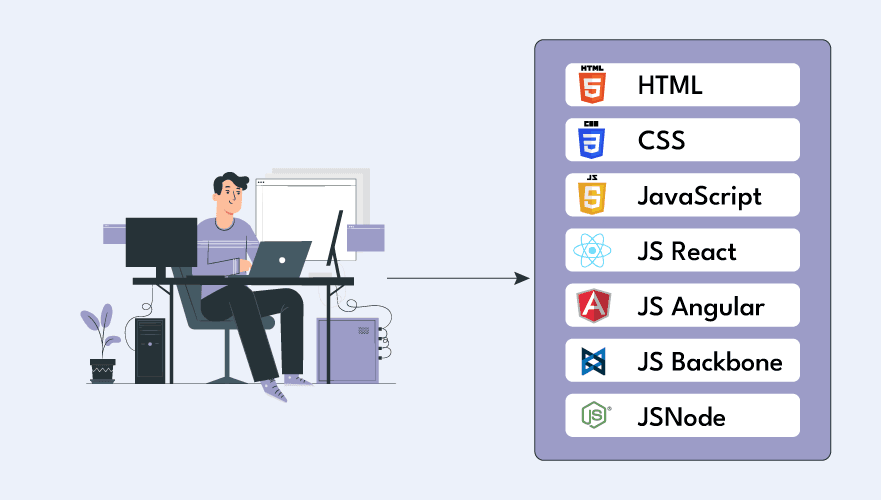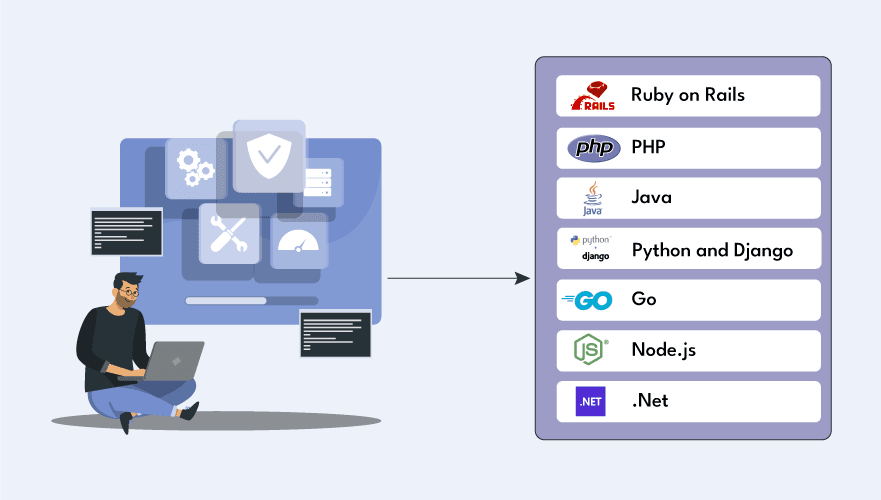

Are you uncertain about choosing a tech stack for your custom web application? This post will provide a comprehensive guide on custom web applications, including web app architecture, types of web applications, and what to consider for custom web app development in 2023 and beyond.
Progressive Web Apps (PWA):
PWA technology allows web apps to provide an app-like experience with fast load times and offline functionality.
Single-Page Applications (SPA):
SPA technology enables a seamless user experience by loading content dynamically without page refreshes.
Serverless Architecture:
Serverless architecture allows for building and running web apps without needing to manage infrastructure, providing scalability and cost savings.
Machine Learning:
Machine learning technology enables web apps to analyze and learn from data to provide personalized and predictive user experiences. Click here to learn more about machine learning and its applications.
Improve your brand's digital footprint with our expert social media app development services, designed to maximize engagement.
Custom web applications are software solutions built for specific companies or purposes, often benefiting small businesses as a cost-effective problem-solving method. A team of specialized programmers typically handles custom web application development, with expertise in specific programming languages, frameworks, or operating systems.
Choosing a web application development company experienced in similar businesses and industries is crucial. A good developer should work closely with you throughout the process and provide regular progress updates. To understand the difference between web and mobile applications, read our comprehensive guide.
The architecture of a web application consists of three core components that work together to facilitate application functionality and user experience
Web Browser (client-side): The front-end or client-side component of a web application is responsible for interacting with users, receiving input, managing presentation logic, and handling user interaction within the app. If you're looking for a reliable web browser, check out our article on Microsoft Edge Browser.
Web Server (server-side): A web application's back-end or server-side component manages the application's business logic. It processes user requests by routing them to the appropriate component and overseeing the application's operations. In addition, a web server can run and handle requests from multiple clients.
Database Server: The database server provides the necessary data for your web application. The data server handles all data-related tasks and can assist in managing business logic by using stored procedures in a multi-tiered architecture.
That was a summary of the three core components of a web application architecture. Let's now delve into several frameworks that can aid in the development process based on the component they support.
A client-side web application development framework is crucial to provide an exceptional user experience with visibility and layout. Here are some technology stacks that can help develop innovative custom web applications focusing on the front end.

HTML: HTML offers a straightforward approach to creating the framework of your web application. It enables you to organize the content of web pages through a variety of page elements.
CSS: CSS assists you in separating website content and layout for sites developed using markup languages. You can use CSS to define a style for elements and reuse them multiple times across various sites.
JavaScript: With JavaScript, you can design appealing interfaces that enhance the user interface/user experience. Because it is client-side, JS can also reduce the server load.
JS React: React.js allows creating UIs specifically focused on single-page applications (SPAs). It also allows you to manage the view layer of your web applications and design reusable UI components.
JS Angular: AngularJS enables you to use HTML as a template language and enhance HTML syntax to make your app's components more explicit.
JS Backbone: Backbone.js is an efficient choice for the fast development of SPAs and the front end. It also allows you to structure and design client-side applications that run in a web browser.
JSNode: Node.js is often utilized in client-side development and the browser, and it enables the implementation of various dynamic interactions on a webpage.
The tech stack mentioned above pertains to the client-side component of the web application architecture. Let's explore what the server-side component offers to develop our custom web application.
The server-side component receives user requests, executes the necessary business logic, and provides relevant information to the front-end systems. This component of your web application comprises servers, databases, web services, and other related components.

Below is a list of the top web app development frameworks you can use to create custom web applications.
Ruby on Rails: Ruby offers excellent time efficiency, making it a valuable tool for writing CGI scripts and embedding them into HTML. Additionally, it is a highly regarded enterprise web app development framework.
PHP: PHP is a widely-used scripting language known for its speed, flexibility, and practicality, making it an excellent choice for web development. With its ability to create dynamic and interactive web pages, PHP is a powerful tool in web development.
Java: Java is a universal programming language for developing desktop, web, and Android applications. Organizations prefer to hire Java developers when building enterprise-grade applications due to their exceptional stability and security features.
Python and Django: Python is a versatile and modern programming language that doesn't require extensive training. It's commonly used for building the backend of websites, and the Django framework built on Python is particularly proficient at handling backend development tasks.
Go: The Go programming language is open-source, fast, and statically compiled, making it ideal for building a simple, reliable, and concurrent web application.
Node.js. Node.js is a cross-platform, open-source runtime environment that allows developers to run network and server-side applications using a vast library of JavaScript. It facilitates fast and high-quality development by being event-driven, asynchronous, and capable of running on a single thread while highly scalable.
.Net: .NET is a software development framework for building desktop and web applications. It includes a powerful yet easy-to-use caching system that improves speed and performance. Additionally, ASP.NET provides automatic monitoring as an added benefit
Tailored Solutions:
Custom web app development ensures that the application meets the specific needs and requirements of the business or organization.
Competitive Advantage:
A custom web app can provide a unique competitive advantage, as it can be tailored to address specific challenges and opportunities within the market.
Greater Control:
With a custom web app, businesses have greater control over the application's features, user experience, and overall functionality.
Flexibility and Scalability:
Custom web app development allows for greater flexibility and scalability as the business grows and evolves.
Seamless Integration:
By developing a custom web app, businesses can ensure the application integrates seamlessly with existing systems and processes, reducing the need for manual data entry and other time-consuming tasks.
Improved Efficiency and Productivity:
Custom web app development can improve efficiency, productivity, and profitability, by automating processes, improving communication, and providing valuable insights through data analytics.
Choosing a custom software development services provider can provide several advantages for your business. A custom software development company can tailor solutions to meet your needs and requirements, provide greater control over the application's features and functionality, and improve efficiency and productivity through automation and data analytics.
They also ensure seamless integration with existing systems, provide ongoing support and keep up with the latest technologies and trends. A custom software development company can help boost your business by providing unique, effective, and scalable solutions.
Client-Centric Approach:
AppSierra prioritizes client satisfaction by understanding and addressing each client's unique needs and requirements.
Experienced and Skilled Professionals:
AppSierra has a team of experienced and skilled professionals who specialize in various technologies and programming languages, enabling them to offer a wide range of services and solutions.
Transparent Communication:
AppSierra maintains transparent communication throughout development, providing clients with regular updates and progress reports.
Ongoing Support and Maintenance:
AppSierra provides ongoing support and maintenance after the project is completed, ensuring that clients receive continued assistance and solutions to any issues that may arise.